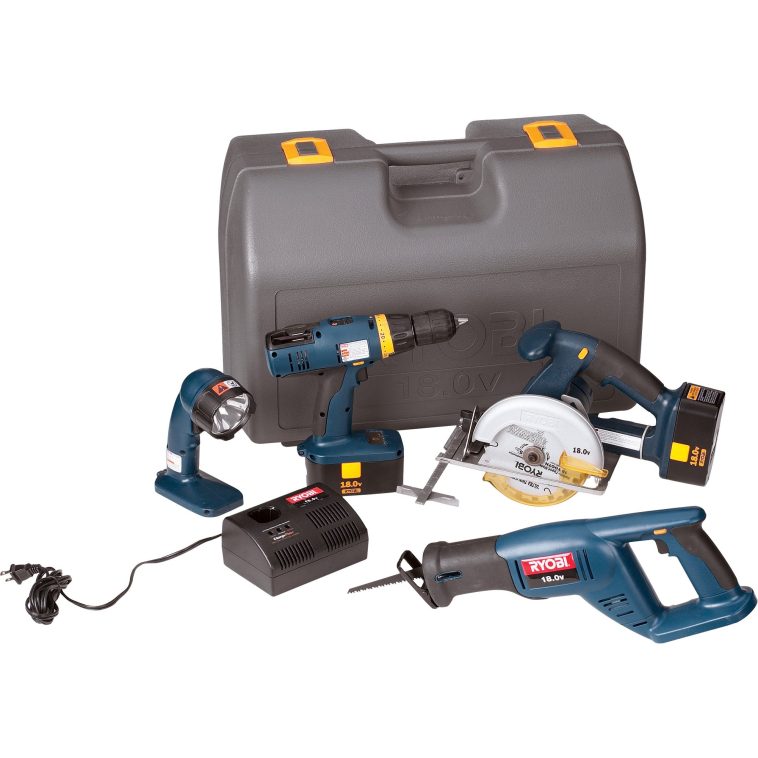
Exclusive Partnerships: A Closer Look at Home Improvement Retail Strategies
In the bustling world of home improvement, retailers continually strive to offer the best selection of hand tools, power tools, and gear for every do-it-yourself enthusiast. One topic that has stirred quite a bit of discussion is why you won’t find Ryobi-branded products at Northern Tool. As an avid reader of home improvement and home services columns, you might have noticed that even though Northern Tool provides an impressive array of reputable brands, Ryobi is notably absent from the lineup. In this opinion editorial, we take a closer look at the reasons behind this phenomenon, dig into the background of exclusive agreements in the DIY market, and examine what this means for the everyday consumer.
Although many retailers such as Lowe’s, Ace Hardware, and Harbor Freight Tools dominate the landscape, Northern Tool has steadily gained ground with its focus on quality selections and top-tier service for the modern DIY audience. However, when it comes to Ryobi, there’s a clear absence—a fact that is not due to a lack of quality or consumer demand, but rather an exclusive retail partnership that has shaped the market over the past two decades.
Understanding the Exclusive Agreement: Home Depot and Ryobi
It is important to understand that Ryobi’s presence in the U.S. market is largely influenced by its exclusive retail agreement with Home Depot. Since the year 2000, Home Depot has been the sole major retailer carrying Ryobi tools, making their range the exclusive destination for customers looking for this brand. This exclusive deal has significant implications for other retailers like Northern Tool.
The exclusive nature of this contract has several key outcomes that affect both the supplier and the retailer:
- Brand Loyalty: Ryobi has built a strong following among DIY enthusiasts who specifically visit Home Depot to purchase their tools.
- Market Differentiation: Home Depot leverages exclusivity as a competitive advantage, further differentiating its product offerings from retailers like Lowe’s or Ace Hardware.
- Supply Chain and Distribution: Exclusive agreements simplify shipment and distribution controls for the brand, ensuring uniform messaging and retail presentation.
For Northern Tool, the outcome is simple—they are unable to offer Ryobi tools on their shelves. Yet, this limitation does not diminish their ability to provide a robust selection of other well-respected brands in the modern power tool space.
Alternative Tools and Diverse Options: Navigating the Northern Tool Selection
Despite the absence of Ryobi, Northern Tool has carefully curated a mix of brands that cater to a wide range of home improvement projects. Instead of feeling limited by not carrying Ryobi, the retailer has invested in offering quality alternatives that meet both professional and DIY standards.
When you walk into a Northern Tool store or browse their online catalog, you’re greeted with a selection that includes top-tier names like Milwaukee, DeWalt, Bosch, and several others. These brands are recognized for their robust performance, longevity, and innovation in the power tool market.
Here is an illustrative overview of some key brands and products available at Northern Tool:
| Brand | Key Offerings | Notable Features |
|---|---|---|
| Milwaukee | Packout system, M12 and M18 Lithium-Ion tools | Durability, innovative battery technology |
| DeWalt | Cordless 20V lineup, advanced safety features | Reliability, broad application range |
| Bosch | Power tools and accessories | Precision engineering, robust build |
| NorthStar | Pressure washers, skid sprayers, compressors | Specialized for outdoor and industrial use |
These alternatives are a testament to Northern Tool’s commitment to quality. Customers looking for high-performance equipment are not left wanting even if Ryobi is absent from the shelves.
Examining the Impact on DIY Enthusiasts and Home Improvement Projects
For many DIY enthusiasts, the availability of a wide-ranging tool selection is essential. The exclusive agreement between Home Depot and Ryobi might initially seem to narrow down options for consumers who are loyal to the Ryobi brand, but broader market dynamics tell us otherwise. Here are some points to consider:
- Consumer Flexibility: Not every tool needs to be from the same brand. Many seasoned DIYers appreciate the distinct strengths of each tool manufacturer.
- Enhanced Innovation: The competitive environment, escalating from exclusive partnerships and varied alternatives, drives manufacturers to innovate continually. This benefits the customer in the long run as each company strives to outdo the others in performance and reliability.
- Comparative Analysis: Crafty consumers often compare the fine points of features and hidden complexities of tools from different brands, allowing them to find the mix that works best for their specific projects.
Indeed, the landscape of home improvement tools is as much about understanding the subtle differences as it is about having a wide selection. Northern Tool’s approach of curating a broad array of quality alternatives ensures that customers have multiple choices, even if their favorite brand of choice isn’t available.
Critical Factors Behind the Absence of Ryobi at Non-Exclusive Retailers
The business strategies behind exclusive agreements can appear challenging to untangle. However, by examining the practical aspects, we can better appreciate how these decisions impact retail dynamics. Let’s explore some critical factors:
Legal and Contractual Hurdles
One of the trickier parts in understanding retailer exclusions is the array of legal and contractual obligations that come with exclusive agreements. Such contracts are typically designed to promote a single point of sale for a brand, ensuring coherent marketing, stable pricing, and consistent product representation across the board.
This means that other retailers, even those with a strong market presence like Northern Tool, simply do not have the legal ability to sell Ryobi products without breaching these agreements. In this case, Home Depot’s arrangement has been both a blessing for Ryobi in terms of market control and a curse for retailers eager to diversify their product portfolios.
Market Positioning and Brand Strategy
Aside from legal hurdles, the decision is also closely tied to market positioning. Ryobi’s strategy focused on building an identity that resonates with a specific segment of DIY enthusiasts through its exclusive collaboration with Home Depot. This strategic choice helped solidify Ryobi as a must-have brand for a segment of the market while leaving a noticeable gap in other retail environments.
When you consider brands like Milwaukee and DeWalt, each has their own set of collaborations and market agreements that guide their retail presence. Northern Tool has capitalized on these opportunities by aligning with brands that share a similar commitment to quality and innovation. While it might be nerve-racking for Ryobi fans to miss out on these tools at other retailers, the overall market scenario continues to offer plenty of alternatives.
Customer Benefits: The Upside of Multiple Alternatives
Despite the initial frustration of not finding Ryobi at retailers like Northern Tool, there are numerous benefits to having a wide array of choices. The diverse options on offer give customers the freedom to select tools that best meet the specific needs of their projects, budgets, and personal preferences.
Let’s break down some of the tangible benefits:
- Broader Selection for Various Projects: Whether your project involves a simple home repair or a full-scale renovation, the multiple available brands ensure that you get the right tool for every task.
- Competitive Pricing: With many brands vying for customer attention, competitive pricing naturally emerges, which can lead to better deals and special offers that benefit consumers.
- Innovation Driven by Competition: The presence of several high-quality brands spurs innovation. As companies like Milwaukee and DeWalt constantly upgrade their offerings, it means that end-users get access to the latest technological advances and improved performance standards.
The cumulative effect of these benefits is a healthier market where consumers are never short of high-performance tools. Northern Tool’s robust selection acts as a counterbalance to Ryobi’s exclusive presence at Home Depot, ensuring that every DIY project has an array of choices to consider.
Comparing Northern Tool with Other Leading Retailers
When mapping out the major players in the home improvement retail space, it’s useful to compare the different strategies adopted by brands. Northern Tool has carved its niche by positioning itself as a destination for high-quality, performance-driven tools that cater to both home enthusiasts and professionals alike. Here’s a comparative look at how Northern Tool stacks up against other key retailers:
| Retailer | Notable Brands Offered | Exclusive Partnerships |
|---|---|---|
| Northern Tool | Milwaukee, DeWalt, Bosch, NorthStar, Generac, and more | None that limit their range significantly |
| Home Depot | Ryobi, among a variety of other OEM brands | Exclusive agreement with Ryobi tools |
| Lowe’s | Multiple industry brands, excluding Ryobi | No exclusive agreements that limit offerings |
| Ace Hardware | Wide range of home improvement tools | No major exclusive partnerships impacting tool selection |
This side-by-side comparison highlights that while Home Depot benefits from exclusive contracts to drive foot traffic, Northern Tool focuses on delivering a diversified, top-quality range that appeals to a broader audience. The strategic choices made by each retailer reflect not only market trends but also the expectations of their respective customer bases.
The Role of Customer Experience in Shaping Retail Strategies
One cannot underestimate the impact of customer experience when analyzing the choices made by retailers. For many shoppers, the decision to visit a particular store is influenced by the confidence they have in the quality and reliability of the products offered. Northern Tool, for instance, has built a reputation for providing tools that withstand the test of time and heavy use, even when facing challenging projects with tricky parts such as intricate installations or nerve-racking repairs.
From the perspective of customer experience, here are a few insights:
- Reliability and Trust: Consumers tend to rely on brands that offer proven durability and excellent performance—even if that means exploring alternatives to their usual favorites.
- Personalized Service: Northern Tool emphasizes expert advice and personalized customer support, ensuring that anyone facing tangled issues in their home improvement projects can find effective solutions.
- Product Education and Support: Informative articles, how-to videos, and in-store demonstrations assist customers in getting into the nitty-gritty of using tools safely and efficiently.
These points underscore the importance of a well-rounded customer experience that prioritizes the needs and concerns of homeowners and DIY enthusiasts. While the exclusive Ryobi agreement may push some consumers toward Home Depot, others appreciate the value of a comprehensive product selection bolstered by knowledgeable staff and robust support systems.
Exploring the Broader Implications for the DIY Industry
Beyond just the immediate impact on tool selections, the strategic decisions made by brands like Ryobi and retailers like Northern Tool have broader implications for the DIY industry as a whole. As market trends evolve, several fine points emerge that are worth noting:
Innovation and Technological Advances: The competitive environment incites brands to invest in research and development. New technologies, such as Lithium-Ion batteries and smart tool integrations, are being incorporated at a faster pace. This race to embrace innovation ultimately leads to tools that offer better power, longevity, and usability, providing immense value for the average consumer.
Response to Market Demands: The home improvement landscape is no stranger to evolving consumer expectations. With more people keen to take on their own projects, whether it’s upgrading outdoor spaces or handling minor home repairs, the need for reliable and versatile tools has never been higher. Retailers who diversify their offerings continue to win loyal customers by providing tailored solutions for varying needs—ranging from quick fixes to complex renovations.
Sustainability and Energy Efficiency: As environmental concerns grow, many tool manufacturers are rethinking their product lines. Energy-efficient designs, reduced emissions, and enhanced durability are becoming super important selling points. Northern Tool’s focus on offering brands with strong commitments to sustainability indicates a shift that benefits both consumers and the planet.
Weighing the Pros and Cons: What Does This Mean for You?
It is both refreshing and somewhat challenging when well-known names are missing from a familiar shelf. For those who may feel disheartened by the absence of Ryobi at retailers like Northern Tool, it is important to consider both the positive and negative sides of this dynamic shift. Here are some pros and cons to help you figure a path through this change:
Pros of a Diverse Tool Selection
- Enhanced Quality Options: Access to multiple brands means you often get tools that have been honed by intense market competition.
- Specialization in Different Niches: From pressure washers to trailers and generators, the diversity of products allows you to source specialized equipment from experts in each field.
- Competitive Pricing: Multiple brand presence typically results in better pricing and occasional promotions, giving you more bang for your buck over time.
Potential Downsides
- Brand Loyalty Challenges: If you have strong personal preferences for Ryobi, searching for a familiar brand might feel off-putting.
- Fragmentation in Product Support: Sometimes, dealing with warranties or service issues can become a bit more complicated when there isn’t a single brand to rely on.
- Initial Confusion: When venturing into a store that is not known for a particular brand, figuring out the best alternative may seem a bit nerve-racking at first.
The overall takeaway is that while exclusive agreements can limit choices in certain retail environments, the resulting landscape often leads to a richer market where competition drives overall quality and customer satisfaction.
Lessons for the Home Improvement Industry
The relationship between exclusive partnerships and diversified offerings provides a treasure trove of lessons for the home improvement industry. From supply chain managers to DIY enthusiasts tackling the complicated pieces of weekend projects, several insights can be gleaned:
- The importance of having multiple quality options ensures that no matter what project you undertake, there is a tool built with that specific use in mind.
- Retailers must carefully weigh exclusive deals against the benefits of a diverse product range, a decision that directly influences customer satisfaction and loyalty.
- For consumers, understanding these strategic moves can help in making informed purchasing decisions, ensuring that the absence of one brand opens the door to exploring other capable alternatives.
This dynamic not only stimulates innovation but also encourages manufacturers to continuously refine the small distinctions in their products—ultimately leading to better, more efficient tools available across the industry.
The Future of Home Improvement Retail
Looking ahead into the next decade, it is clear that the trend of exclusive agreements versus broader selections will continue to shape the home improvement landscape. Retailers like Northern Tool have shown that even without carrying every popular brand, a focus on quality and customer service can drive success.
As more consumers take on DIY tasks, the need for ergonomic, durable, and user-friendly tools is growing. This shift in demand suggests that:
- Technological Integration: Future tools may increasingly feature smart technology that connects with home automation systems, allowing users to monitor performance and energy usage.
- Sustainability Goals: Both manufacturers and retailers are likely to invest more in environmentally friendly product lines, signalling a shift toward green home improvement practices.
- Local and Niche Markets: With the growth of e-commerce alongside traditional brick-and-mortar retail, there could be more emphasis on localized inventory that caters precisely to the preferences of regional DIY demographics.
For savvy shoppers, these developments represent exciting opportunities to get their hands on tools that not only get the job done effectively but also contribute to a smarter, greener, and more connected home environment.
Final Thoughts: Embracing Change and Exploring Alternatives
The absence of Ryobi at Northern Tool is more than just a simple stock decision driven by an exclusive retail agreement—it is a reflection of the broader, evolving dynamics within the home improvement market. While some might find it a bit overwhelming or confusing at first, the diverse selection of reputable brands available offers consumers plenty of avenues to get the job done right.
As we take a closer look at this shift in the marketplace, it is important to remember that the ultimate goal for retailers is to serve the DIY community with the best products available. With high-quality alternatives from brands like Milwaukee, DeWalt, Bosch, and NorthStar lining the shelves, Northern Tool has successfully navigated the twists and turns of supply restrictions by focusing on what it does best: offering reliable, high-performance tools that empower homeowners and professionals alike.
For the committed DIY enthusiast, this competitive environment means never having to settle for less. Instead, it invites you to explore the fine details of what each tool offers—enabling you to choose equipment tailored perfectly to your needs, whether you’re managing your way through a quick fix or tackling a full-scale renovation.
In conclusion, while the absence of Ryobi might initially seem like a limitation, it is, in fact, an example of how strategic partnerships and thoughtful product curation can drive innovation and quality in the home improvement industry. By embracing the available alternatives and keeping an open mind to new possibilities, you can truly enjoy a toolkit that meets all your construction, repair, and remodeling needs.
At the end of the day, the world of home improvement is a vast landscape, full of opportunities hidden amongst the subtle details and little twists that make every project unique. So, whether you’re a seasoned pro or a weekend warrior, remember that the right tool is one that helps you figure a path through the project’s tangled issues, making each task enjoyable and ultimately rewarding.
Originally Post From https://www.slashgear.com/1920350/why-northern-tools-does-not-sell-ryobi-reason/
Read more about this topic at
Why is Home Depot the only major retailer selling Ryobi …
Supplier Profile: Exclusive Home Depot Partner RYOBI on …


